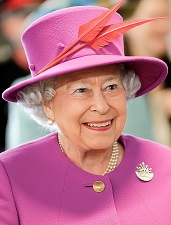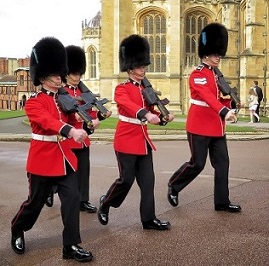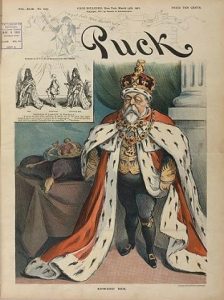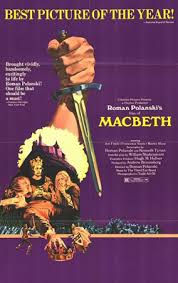
From wikipedia.org / © Joel Rouse / Ministry of Defence
London Bridge is down. No, I’m not referring to a movie that stars Gerald Butler. I’m talking about the code-phrase used to communicate the news of the monarch’s death to the British government, police, armed forces and broadcasters, triggering the start of an elaborate and much-prepared plan that oversees the monarch’s funeral, the period of national mourning and the coronation of a successor. Those words were sent to the British establishment earlier this week, for September 8th saw the passing of Queen Elizabeth II at the age of 96.
Not long ago, at the time of the Queen’s Platinum Jubilee, I expressed my thoughts about the British monarchy on this blog. Namely that, while monarchies might work for other European countries, slimmed-down monarchies in countries with fewer historical neuroses and fewer modern delusions than Britain, the British monarchy just seemed to epitomise and encourage so much stupidity, unfairness and obsequiousness that it wasn’t worth conserving.
That’s been my view for most of my life. Admittedly, for a few years around the 2012 London Olympics I took a slightly more benevolent view of the institution: “…my opinion was more sanguine, at least of Elizabeth. It was one of indifference tempered with a certain, grudging respect.” This was “partly because I’d concluded that countries needed their symbolic heads of state – someone to open the supermarkets, launch the ships and sit down and sip tea with the US President or the Pope or whatever foreign dignitary happened to be in town. This was the stuff that the prime minister didn’t have time to do because he or she had a country to run….”
Furthermore, Danny Boyle’s Opening Ceremony at the 2012 London Olympics had temporarily fooled me into believing “that with a bit of tweaking – for instance, modifying but not removing the Royal Family – Britain could become a decent, balanced, good-humoured and modern-minded country. Also, I was a big James Bond fan and, at the Opening Ceremony, I thought it was pretty cool when the Queen, or possibly her stunt double, parachuted out of a plane with Daniel Craig.”
By the time of her Platinum Jubilee earlier this year, however, and with the country infected by the jingoistic and backward-looking craziness of Brexit, which called to mind not Danny Boyle’s Olympic Opening Ceremony but Danny Boyle’s apocalyptic zombie movie 28 Days Later (2002), my tune had changed. Britain had become such a basket-case that if it was to survive in any sane form, it needed drastic surgery carried out on its many, ridiculously-archaic institutions. This included the abolition of its monarchy.
And I’m afraid the Platinum Jubilee’s sequel to the Queen’s hook-up with James Bond at the 2012 Olympics, which featured her having tea and marmalade sandwiches with Paddington Bear, didn’t work for me. Paddington, after all, was an immigrant who’d arrived undocumented from Peru and, in the rabid atmosphere of 2022 Britain, Priti Patel would probably have stuck him on a plane and flown him off to Rwanda for ‘processing’. Also, I thought it must have been terrifying for poor Paddington to find himself in a palace guarded by men wearing the skins of his relatives on top of their heads.

From unsplash.com / © Anika Mikkelson
The next days – weeks, months – will showcase all the idiocies that afflict modern-but-monarchist Britain. The Queen’s funeral and the coronation of son Charles will be a never-ending ordeal of Ruritanian faff and ritualistic flummery. Many Britons, of course, approve of this and believe it represents threads of tradition that run back to the country’s distant past. Actually, much of this arcane pomp was devised by that randy old goat Edward VII at the start of the last century. I find it fascinating, incidentally, that one of Edward VII’s many mistresses was Alice Keppel, great-grandmother of a certain Camilla Parker-Bowles.

From wikipedia.org / © Udo Keppler 1901
There will also be tsunamis of sanctimonious and sycophantic drivel written and broadcast about the Queen by the toadies, grovellers, cap-doffers, forelock-tuggers and brown-nosers that infest Britain’s mainstream media. One of life’s great ironies is that the media currently churning out drooling eulogies about the wonderfulness of the departed monarch was the same media that made life hell for many of her family’s members. Her ex-daughter-in-law wouldn’t have died in a car-crash in 1997 if there hadn’t been a fleet of paparazzi pursuing her, desperate for photos to sell to the tabloids. Incessant media hounding and tittle-tattle was a major reason why Prince Harry chose to bail out of the royal circus. And who can blame him? If British journalistic hacks thought they could accuse his wife Meghan Markle of murdering the Queen and get away with it, they would.
And inevitably, the Queen’s passing will add a tankerload of fuel to the culture-war fires that have burned across Britain since 2016 and Brexit. Already, social media has been overrun by people, swivel of eye and gammon-pink of complexion, desperate to weaponise her death against the woke, lefty snowflakes they hate so much. Spencer Morgan, son of the dreaded Piers Morgan and a supposed champion of free speech, opined the other day: “Sad thing is there will be people in this country celebrating this. They’re the ones we need to focus on deporting.” Correction: a champion only of free speech he agrees with. In his case, obviously, the blighted apple hasn’t fallen far from the twisted old tree.
Meanwhile, Henry Bolton, embarrassingly short-lived leader of the United Kingdom Independence Party (he lasted less than five months), expressed his disgust that “most British schools no longer teach their pupils the National Anthem, or fly the Union flag” and called on Liz Truss to “issue an instruction to all schools to rectify this omission, and do so prior to Queen Elizabeth II’s funeral.” Funnily enough, I went to school in the 1970s and 1980s and I don’t remember being taught the National Anthem or seeing the Union Jack flying back then. And a couple of my schools were attended by Northern Irish Protestants, generally the most Queen-adoring, flag-respecting folk in the UK.
Meanwhile, at this moment, I’m sure social media accounts are being scoured the length and breadth of the country. This is as right-wing journalists, politicians and rabble-rousers search for any off-message disloyalty towards Her Majesty expressed by supporters of political parties they disapprove of (Labour, the Scottish National Party, the Greens), members of news outlets they disapprove of (Novara Media), fans of football clubs they disapprove of (Liverpool, Celtic), comedians they disapprove of (Joe Lycett), etc., intent on starting a holy war if they find something. Already on twitter, I’ve seen one right-wing gobshite fulminate at Jeremy Corbyn for, in a tweeted tribute to the Queen, reminiscing that he “enjoyed discussing our families, gardens and jam-making with her.” Clearly, it was okay for Paddington Bear to discuss marmalade with the recently deceased Her Majesty, but not okay for Jeremy Corbyn to discuss jam with her.

Thanks to all the patriotic breast-beating and blabber, this is a golden opportunity too for newly-anointed Prime Minister Liz Truss and her government, a government in which talent is not so much lacking as non-existent, to sweep under the carpet the multiple crises facing the country. Mind you, as those crises include skyrocketing energy bills and inflation, Brexit’s crippling of the economy, the war in Ukraine, the potential arrival of new, deadlier Covid variants and the climate-change emergency, the bulge created under the carpet will be pretty huge. The right-wing mainstream media will aid and abet this. Already, we’ve had the BBC’s Clive Myrie dismiss the energy-bill calamity as ‘insignificant’ compared to the royal news.
Personally, I won’t be grieving over the Queen’s departure, though I feel slightly sad to see her go. That’s mainly because I liked the fact that she’d been a living link with so much history. She was the last surviving world leader to have served (admittedly tenuously) during World War II – she’d been a member of the women’s Auxiliary Territorial Service (ATS). She’d met 13 out of the 14 past US presidents, kicking off with Harry Truman, missing out on Lyndon B. Johnson for some reason, and surviving her encounter with the hideous, ignorant, orange-skinned one. She came face to face with Marilyn Monroe when, coincidentally, both of them were 30.
She also had to deal with 15 UK prime ministers, firstly Winston Churchill and finally Liz Truss, which doesn’t suggest there’s been any progress in intellect and ability in British politics during the last 70 years. Quite the reverse. By the way, I’m glad she managed to outlast Boris Johnson’s premiership by a couple of days. Perhaps it was her wish not to have that bloviating narcissist hogging the limelight as PM during her mourning and funeral that kept her going until September 8th.
I should add that I feel that same sense of historical loss whenever someone very old passes away. When I was a kid in Northern Ireland, I knew an elderly lady who could recall the days when Victoria had been on the throne, and being around her when she reminisced was like being in the presence of a human time machine. (Despite being a Northern Irish Protestant, she’d hated ‘the Widow at Windsor‘.)
I saw Queen Elizabeth II in the flesh once, back in 1999, when she attended the opening of the new Scottish Parliament in Edinburgh. I was among the crowds along the sides of the Royal Mile when she and Prince Philip scooted past in an open carriage with horsemen riding behind and in front of them. The crowd went, “Hurrah!” Then one of the horses discharged several big dollops of dung onto the street’s surface. While the royal cortege receded, two workers from the city council, a man and woman who looked near retirement-age, hurried onto the street and used brushes and shovels to scoop up the dung and put it in a binbag. The crowd promptly saluted the council workers by shouting “Hurrah!” again. Delighted, the workers accepted this with a gracious wave of their shovels.
Looking between those two humble council workers and the procession making its way up the Royal Mile, I knew where my sympathies lay.






